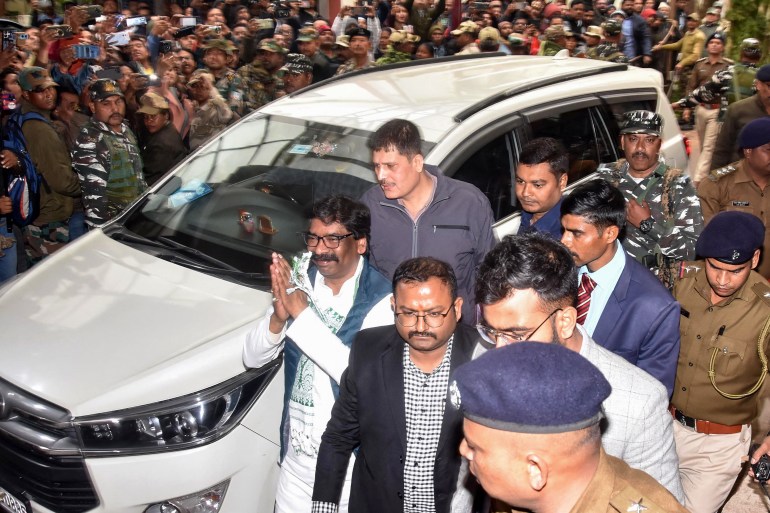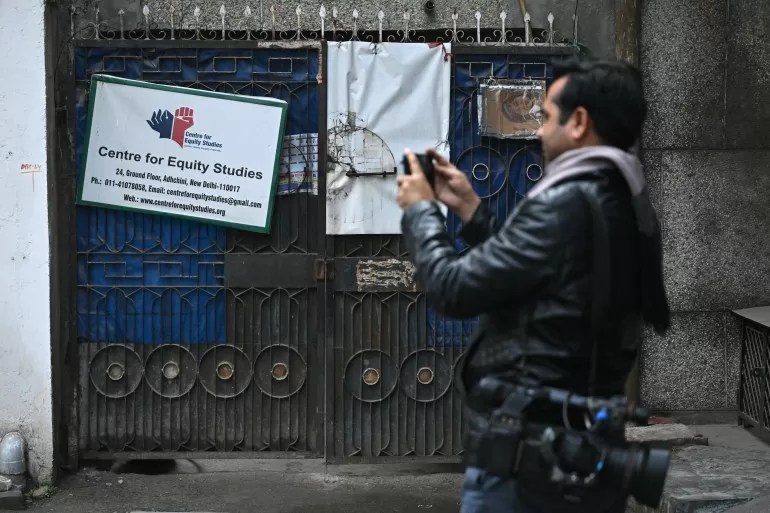Officials of the Central Bureau of Investigation (CBI) on Friday morning raided the residence of former bureaucrat Harsh Mander and the office of a think tank, the Centre for Equity Studies (CES) in New Delhi, linked to him, alleging financial irregularities under the Foreign Contribution (Regulation) Act.
Mander served as an Indian Administrative Service officer for 22 years before he resigned in 2002 in the wake of the riots in Gujarat state when Modi was its chief minister. More than 1,000 people died in the violence, most of them Muslims, according to the state government.

Mander has been a fierce critic of the Modi government’s Hindu supremacist agenda since the prime minister’s Bharatiya Janata Party (BJP) came to power in 2014.
But he is only the latest in a series of critics and opponents who have faced raids or arrests from federal agencies in recent weeks — including four state chief ministers belonging to opposition parties.
On Wednesday, India’s financial crimes agency, the Enforcement Directorate (ED), arrested Hemant Soren hours after he resigned as the chief minister of Jharkhand state. Soren is accused of corruption, a charge his party has denied.

Other opposition leaders, including Tejashwi Yadav, the former deputy chief minister of neighbouring Bihar state, and Arvind Kejriwal, the chief minister of Delhi, have also been raided by federal agencies in recent months. Kejriwal’s deputy and one of his party’s parliamentarians are already in jail.
In the central Chhattisgarh state, Chief Minister Bhupesh Baghel and his associates were picked up by the ED officials right before elections in November last year. The BJP accused them of multiple scams, including an illegal coal mining deal, and used the charges as a major plank to win the state polls.
‘It is paralysing’
Apoorvanand, professor of Hindi literature at the University of Delhi and one of Mander’s close acquaintances, said he woke up to the “upsetting news” of Friday’s raids.
“Mander and the civil society members have been relentlessly hounded by the investigative agencies,” he told Al Jazeera.
“It is not only about Harsh [Mander], it is a pattern that we see. Civil society in India has been defunded and several have been jailed. It is paralysing,” he said. “It is also a signal to civil society: you can talk on water conversation or solar panels in villages but do not speak for human rights or rights of minorities.”
The government has alleged Mander accepted foreign contributions amounting to nearly $14,000 between 2011 and 2018 in the FCRA account of his association, violating the law. Recently, the government suspended FCRA licences of several think tanks and close to 6,000 NGOs, including Oxfam India and Amnesty India.
“These raids or allegations of financial irregularities seem to have become a norm for the authorities to silence peaceful criticism,” Meenakshi Ganguly, the deputy director of Human Rights Watch’s Asia division, told Al Jazeera.
Several activists are currently facing charges, some under draconian terror laws. “When independent state agencies are seen to act in a partisan manner, with politically motivated targeting of dissent, it undermines India’s image as a country that upholds the rule of law,” Ganguly said.
‘Agencies work for BJP’
Sushil Sunny Agrawal, a 39-year-old former minister in Baghel’s cabinet, was among the politicians the ED raided before the state elections last year.
“They mentally tortured us. The ED officials told me: ‘What’s in there to stay with the Congress? Join BJP, that’s where the future is,’” Agrawal told Al Jazeera.
“These agencies have become liaisons for the BJP. They deal on their behalf: If you go with Modi, you will be cleared from all this and stand a chance at a bright future.”
The upcoming general elections are keeping Agrawal on edge. “The BJP knows no limits. And they are in a full-on attacking mode, weaponising the central agencies to completely curb the opposition,” he said.
Agrawal said he looked to India’s judiciary to address the escalating crackdown on opposition parties.
In March 2023, a group of opposition parties petitioned India’s top court, stating “a clear pattern of using investigative agencies … to target, debilitate and in fact crush the entire political opposition and other vocal citizens”.
The petition noted that since 2014, when Modi came to power, 95 percent of the cases taken up by the CBI and the ED have been against politicians from the opposition – a 60 percent and 54 percent rise, respectively, from the days of the previous Congress-led government.
However, the Supreme Court refused to rule on the petition, noting that politicians could not be placed on a pedestal higher than citizens, could not seek special treatment under the law, or immunity from arrest.
“When [political parties] argue that there is a chilling effect on the opposition because of CBI/ED cases against opposition political leaders, the answer lies in the political space and not in courts,” said the court.
Supreme Court lawyer Prashant Bhushan said, “Like the politicians, the civil society or anybody who is a critic of this government is being targeted.”
“This is the rise of a fascist state under Modi and unfortunately, the judiciary is doing very little or hardly anything to protect the rights and liberties of the citizens. Its independence appears to have collapsed.”
Agrawal said the Modi government is “hijacking” the forthcoming vote by targeting opposition leaders and activists. “Democracy has completely ended in India,” he said.
Apoorvanand concurred. The crackdown by the government was an attempt to establish a one-party rule in India, he told Al Jazeera.
“When the opposition parties should be hitting the roads [to campaign] ahead of the elections, they are running from one agency to another,” he said. “The campaigns are distracted and their followers will be demoralised. You can practically achieve a one-party state without changing the constitution.”
“From the civil society to academia, I can feel this fear – who’s going to be next?” said Apoorvanand.
According to Agrawal, the answer is clear. “Whosoever that doesn’t walk with Modi, who raises voice against them, they are the next,” Agrawal said.
“If a common man raises his voice against the government, then the civilians will be the targets.”
